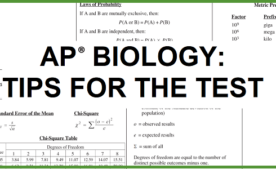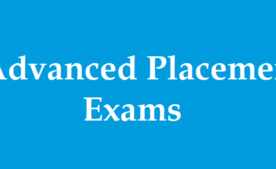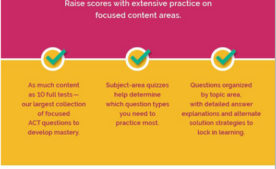A convergence of factors recently has elevated our high school community’s interest and uncertainty about how Advanced Placement (AP) exams will or will not be used by college admission officers.
One of these factors was the elimination of The College Board Subject Tests this year. Other factors were pandemic-related: colleges announcing temporary or permanent test-optional policies and students unable to have an SAT or ACT score due to limited test center capacities and high demand. The news about Subject Tests, however, has generated the most questions in the context of the AP testing landscape.
In January 2021, The College Board announced it would immediately cease its administration of Subject Tests to U.S. students. For international students, it would provide two more administrations, in May and June of 2021, before eliminating the program.
Over the last several years, Subject Tests have been a disappearing market, translating to a decrease in revenue, for The College Board as colleges and universities dropped them from their application requirements.
Subject Tests were similar to APs in that they tested students’ knowledge of a single subject area. In pre-COVID times, Subject Test scores were recommended by a very small number of highly selective schools as well as required or recommended by technical, medical, and engineering programs at a few colleges and universities. Even though very few schools or programs required or recommended Subject Tests, some students used them as a supplemental data point to enhance their college applications. Additionally, students at high schools that did not offer AP courses in their curriculum might have chosen to use Subject Test scores to showcase their knowledge of a particular subject.
AP Program and AP Exams – The Basics
The College Board’s Advanced Placement program offers college-level course work to high school students, culminating in an official in-school AP exam. (Subject Tests differed in that they assessed high-school level skills and were administered at national test centers by College Board proctors.) Some U.S. colleges and universities use high AP test scores for course placements, to waive a prerequisite, or to offer course credit.
Most AP classes run from September through May. Generally, AP exams are 3 to 3.5 hours long and administered during the first 2 weeks of May (except for this year, however, more on this to follow). Data from 2020 shows that the most popular AP exams were in these courses, in descending order:
1. English Language & Composition
2. U.S. History
3. English Literature & Composition
4. World History
5. Psychology
6. U.S. Government & Politics
7. Calculus AB
8. Biology
9. Human Geography
10. Statistics
The exams consist of multiple choice and free-response questions. AP scores are on a 1 through 5 scale, 5 being the highest.
It’s important to note that AP courses are offered in some but not all high schools. The industry jargon around this is that a high school is an ‘AP school’ or a ‘non-AP school’. Some non-AP schools will still choose to administer AP exams for their students. However, in order for a high school to offer AP courses, the teachers must be trained and the school curriculum approved by The College Board for each subject area. You can imagine that it requires time, budget, and staff resources to teach AP courses in school.
We in the test preparation industry will be watching how the push-pull unfolds between whether colleges decide to weigh AP scores differently and whether high schools decide to invest more in AP programs. At the very least, we believe that there will not be any immediate change in the environment for the Class of 2022. We will publish new information as we learn more. Our recommendation to families is to always check with your counselor and/or the college website when you have questions about how AP tests are considered.
Changes to 2021 AP Exams due to COVID
The College Board altered its testing window this year due to the current public health crisis. As stated earlier, AP exams are typically scheduled for the first 2 weeks of May. However, because of COVID the 2021 AP exam schedule gives schools a choice among three 2-week testing windows between early May and mid-June. Paper or digital exams are offered, depending on the subject and exam date. Decisions about testing dates and modes are made by schools and districts; at-home testing must be authorized by the AP coordinator for each eligible student.
Your school’s counseling office or AP coordinator will communicate directly with students as to where and how the tests will be administered.
It is our understanding that in April The College Board will be providing access to the digital testing application so students will have an opportunity to practice with each type of multiple-choice and free-response question as well as with using the tools and features in the application.
FAQs about the State of AP Exams
Q: Is the entire AP class content going to be on the AP test this year and will it be the full test?
A: Yes. Unlike last year where they abridged the exams to at-home, online administrations lasting 45 minutes, this year’s exams revert back to the regular 3 – 3.5 hour test and cover all content in the course curriculum.
Q: What is a good score on an AP exam?
A: Two things to keep in mind: first, taking any AP course demonstrates strength of curriculum, which is a factor that 84% of colleges consider to be important in a student’s application, and second; a “good” score depends on the AP subject and how the schools you are applying to use the scores. Historically, a score of 4 or 5 is considered exceptional. Different schools have different policies around scores of 3. The College Board publishes a chart of AP score distributions by test. Always check with your counselor for guidance.
Q: My student’s school is a non-AP school and they will be applying to highly selective schools, should they take any AP tests?
A: It is challenging to give general advice along this question. High schools have different curriculum and different policies (e.g. you may need to obtain special permission to take the exam at your school or you may have to find another school willing to let you test there). Check with your counselor to understand what the policies are around letting students take the AP exams.
Q: Are there diagnostic practice AP tests that students take (like practice SAT and ACT)?
A: The College Board offers practice test resources on its website which can be shared with students by their AP teachers. Also, released exam content including free-response questions and audio prompts for every course can be found on that course’s Exam tab. Start on the AP Course and Exam index page.
TIP: The College Board publishes a “course and exam description” for each subject, which is a fantastic resource especially for students making decisions about AP course enrollment. The course and exam description contains the course syllabus and provides sample exam questions.
If your student needs help with AP exam prep
Summit’s one-on-one AP tutoring program provides personalized tutoring and test preparation for over a dozen AP topics. Our highly skilled tutors will help with the coaching, practice, and support to help you succeed on these tests.
As with all our programs, the focus is on your student’s needs and goals. Contact us if you’d like to discuss your particular situation.



















